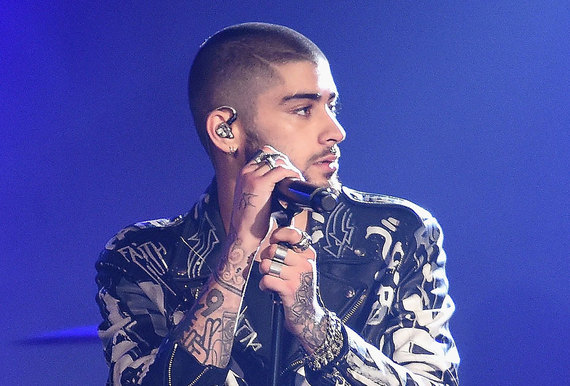In junior high, two friends invited me to a One Direction concert. Like any awkward, angsty preteen, I was terrified -- 1D was a boy band, existing in categorical defiance of everything "alternative or cool" in the mind of a budding pseudo-critic. Still, full of doubt, I went to the concert.
Somewhere between the first song and the ride home, I was mesmerized -- not necessarily by the band, but by Zayn Malik.
To understand Zayn's role in One Direction, it's important to understand the boy band as a product. Members of a world-famous musical group rarely have control over their image. They are compartmentalized from complex individuals into profitable cultural archetypes: the funny one, the smart one, the cute one. Often, the band was marketed as simply "white," which is an erasure of Zayn's complex identity as a Pakistani-British Muslim. But from the start, Zayn's caricature in the construction of a "dark, brooding outcast" seemed to be connected to his status as the ethnic and religious outlier of the group.
Zayn's existence as a Muslim and Pakistani pop star has never been without commentary, from those both inside and outside his ethnic and religious communities. Some heralded him as a breaker of barriers who increased opportunities for South Asians in mainstream media. The discourse surrounding Zayn often focused on the concept of a Muslim pop star as oxymoronic, seeing the two in opposition to one another. For some, his membership in a boy band -- which is kind, respectful and romantic by definition -- stood at odds with the Islamophobic stereotype of the Muslim-American, like when Bill Maher compared him to Boston Marathon bomber Dzhokhar Tsarnaev, or when a political blogger accused him of "boyband jihad." For others, it contradicted religious interpretations of the behavior expected of a Muslim.
Amid all of this speculation, Zayn has never shown a particular desire to express a political opinion on his identity (which, in the landscape of modern America, is difficult to do). The only notable example of him doing so was when he tweeted #FreePalestine and immediately faced death threats. His lack of expression bothered many; it made him an imperfect symbol in a world where superstars are expected to be everything we want, and where single Muslims are forced to speak for an entire population. In a way, his inability to control his image in One Direction paralleled the way that Muslims are restricted by limiting, rare portrayals and not given the freedom to tell our stories.
In the ultimate expression of his outsider identity, Zayn left One Direction -- and like everyone up to something big, he cut his hair (into a blond buzzcut). Now there would be no mistaking the old Zayn for the new. He sent out tweets explaining his departure, punctuating one with #realmusic, and in an interview, he talked about not being allowed to make music influenced by his preferred genres of hip-hop and R&B because of the pressure for a pop sound in One Direction. As a fan, my mind raced. With this single action, Zayn shattered the pristine image of 1D, revealing a complex organism built on real people, subject to real strains on human relationships.
He released an album exactly a year after his departure from the band, titled Mind of Mine. The title is enough to tell that Zayn was making work that was explicitly his and, in effect, snatching the pen to write out a space for himself on his own terms. This act of control means something for all Muslims who need better representation. Like post-One Direction Zayn in general, the album held few references to his identity, aside from "Flower," an acoustic intermission sung entirely in Urdu.
The album's discussions of love, sex and youth have been criticized as stereotypical, but they are exactly what one could expect from an artist who left One Direction because he wanted to "be a normal 22-year-old." Perhaps in wanting to be normal, he simply wanted to not have to deal with the direct juxtaposition of himself against the rest of the band -- to exist as himself, and not as an outsider.
Zayn's story has been one of a complex dance with identity. In his comments about the album, I get the sense that he doesn't even know who he is, and that he has actually embraced this state of limbo. For me, he has become a poster boy for letting yourself figure it out, of understanding that there is no way to know who you will be today or tomorrow and embracing that truth as a blank canvas on which to forge a new identity (even in a world desperate for you to fit its expectations).
For the black Muslim girl who went to the One Direction concert in junior high, trapped between a million versions of who she could be, Zayn holds countless lessons for me.
This article was written by teen reporters from The Mash, a bi-weekly publication distributed to Chicagoland high schools.
